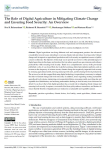Balasundram S.K., Shamshiri R.R., Sridhara S., Rizan N. (2023). The role of digital agriculture in mitigating climate change and ensuring food security: an overview. Sustainability, 15/03/2023, vol. 15, n. 6, p. 1-23.
https://doi.org/10.3390/su15065325
https://doi.org/10.3390/su15065325
| Titre : | The role of digital agriculture in mitigating climate change and ensuring food security: an overview (2023) |
| Auteurs : | S.K. Balasundram ; R.R. Shamshiri ; S. Sridhara ; N. Rizan |
| Type de document : | Article |
| Dans : | Sustainability (vol. 15, n. 6, March 2023) |
| Article en page(s) : | p. 1-23 |
| Langues : | Anglais |
| Langues du résumé : | Anglais |
| Catégories : |
Catégories principales 06 - AGRICULTURE. FORÊTS. PÊCHES ; 6.4 - Production Agricole. Système de ProductionThésaurus IAMM AGRICULTURE NUMERIQUE ; CHANGEMENT CLIMATIQUE ; ATTENUATION DES EFFETS DU CHANGEMENT CLIMATIQUE ; SECURITE ALIMENTAIRE ; EVALUATION DE L'IMPACT |
| Résumé : | Digital agriculture involving different tools and management practices has advanced considerably in recent years, intending to overcome climate risk and reduce food insecurity. Climate change and its impacts on agricultural production and food security are significant sources of public concern worldwide. The objective of this study was to provide an overview of the potential impact of digital agriculture technologies and practices that can reduce greenhouse gas emissions and enhance productivity while ensuring food security. Based on a comprehensive survey of the previously published works, it was found that due to global warming, altered precipitation patterns, and an increase in the frequency of extreme events, climate change has negatively impacted food security by reducing agricultural yields, slowing animal growth rates, and decreasing livestock productivity. The reviewed works also suggest that using digital technology in agriculture is necessary to mitigate the effect of climate change and food insecurity. In addition, issues regarding creating sustainable agricultural food systems, minimizing environmental pollution, increasing yields, providing fair and equitable food distribution, and reducing malnutrition leading to food security were discussed in detail. It was shown that while digital agriculture has a crucial role in mitigating climate change and ensuring food security, it requires a concerted effort from policymakers, researchers, and farmers to ensure that the benefits of digitalization are realized in a sustainable and equitable manner. |
| Cote : | En ligne |
| URL / DOI : | https://doi.org/10.3390/su15065325 |







